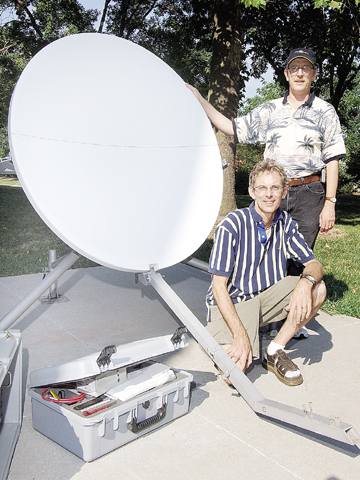| |
|
|

from the issue of September 29, 2005
|

| |
|
|
| |
Staffers set up post-Katrina communications

BY DAN MOSER, IANR NEWS SERVICE
Two UNL staffers are back home after helping build an emergency communications network in Hurricane Katrina-ravaged Mississippi.

| | 
 
| | | Mark Hendricks, left, of Communications and Information Technology, and Cliff Ritz of Information Services pose with communications equipment. Hendricks and Ritz hauled the equipment in a university van to Gulfport, Miss., earlier this month to set up emergency communications systems after Hurricane Katrina. Photo by Brett Hampton/IANR News Service.

|
Their experience also may help land-grant universities be better prepared in the event of future crises.

Mark Hendricks, a multimedia information specialist with Communications and Information Technology, and Cliff Ritz, a network specialist with Information Services, loaded a university van with a satellite dish and other communications equipment and headed south on Sept. 11. Their initial goal was to set up communications for a team of about 30 medical students and doctors from Virginia Tech helping treat storm victims.

The mission was set up by the UNL-based ADEC, a consortium of land-grant universities and colleges that believed its expertise in cutting-edge education and information technology could help the devastated region, said Janet Poley, president of the group.

"I was very pleased that UNL and the Institute of Agriculture and Natural Resources agreed immediately to share Mark and Cliff with those in need," Poley said. "It is rewarding to see the university and others in the state out in front with a rapid response strategy. Also, the funding from the National Science Foundation over the past five years made this possible."

By mid-morning on the day after they arrived, Hendricks and Ritz established Internet access and voice-over Internet phone service for the medical team in Gulfport, Miss.

As some of the first university responders on the scene, Hendricks said they also served as an unofficial advance team providing information to other universities about the types of equipment and services needed.

As normal communications were restored, the UNL team provided its equipment to Alcorn State University in Mississippi, which was still without communications.

Hendricks said the experience was a real partnership pulled together by ADEC's leadership and helped by ADEC's "people network," which includes members at universities throughout the storm-damaged region who were able to let colleagues around the nation know what was needed. Also, Sen. Ben Nelson's office played an important role in getting the UNL team credentials so it could get access to the region.

Poley noted that the UNL team's work was only a part of ADEC's contribution to Katrina relief. Other ADEC members, including Texas A&M, helped set up satellite/wireless systems in extension field offices in the region.

"We are also collecting a large amount of information about this mammoth disaster and the organizational, human-social and behavioral aspects, telecommunications infrastructure and other insights that should help us in improving our disaster assistance in the future," Poley said.

Hendricks, who returned on Sept. 16, said the experience will help universities respond in the future. His observations include the necessity for a quicker response and need to be flexible and adapt to situations that change quickly.

"I wish we'd been there three days earlier," Hendricks said. "I think we could have been even more help."

Hendricks was impressed by the resiliency and courage of the region's residents and in awe of some "real heroes," including a firefighter named Kevin who worked closely with the Virginia Tech medical students and doctors to get them whatever they needed.

"He was a can-do, do-everything guy," Hendricks said

Both Hendricks and Ritz were pleased and honored to be able to contribute.

"How many times are geeks called in to help?" he said with a laugh.
GO TO: ISSUE OF SEPTEMBER 29
NEWS HEADLINES FOR SEPTEMBER 29
Staffers set up post-Katrina communications
Chancellor outlines energy issues
Energy rates chill campus utility budget
Grant links math, biology research
Olds receives award from French govt
FROM THE ARCHIVES
Professor, students aid mural project
Speaker to review national trends in student advising
732218S35002X
|
|
|
|
|
|
|
|